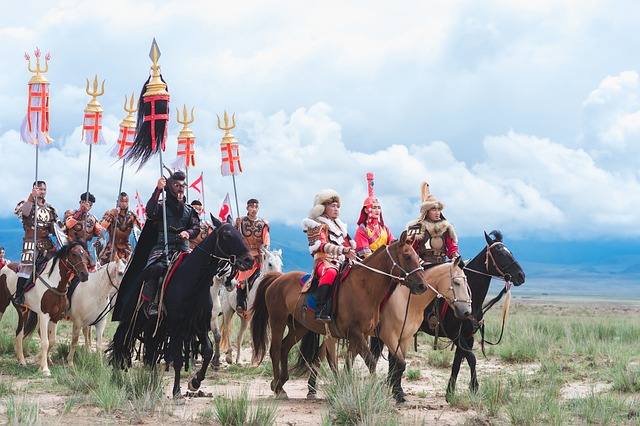Genghis Khan: The Legendary Conqueror and Leader
Genghis Khan, the name that resonates with the image of a 'universal ruler' who once conquered nearly half of the world, holds a place in history like no other. From the Pacific Ocean in the East to Eastern Europe in the West, his mighty Mongol empire extended its dominion. In this article, we delve into the life and legacy of this formidable warlord, exploring the top 10 intriguing facts about Genghis Khan.
1. One in 200 men are direct descendants of Genghis Khan.
While Genghis Khan is often remembered as a conqueror, his legacy goes beyond his conquests. Recent DNA research has revealed a staggering fact: approximately 16 million men in Central Asia can trace their lineage back to him. His amorous adventures and numerous marriages led to a vast network of descendants, some of whom played significant roles in ruling dynasties across Russia and Asia, including the Yuan Dynasty in China and the Mughal royal families.
2. His gravesite remains a mystery.
One of the greatest mysteries surrounding Genghis Khan's life is the location of his gravesite. Although it is believed to be on Burkhan Khaldun, this has never been confirmed. Legend has it that Genghis Khan himself insisted that his gravesite remain unmarked and its location unknown. Many who attempted to find it met untimely ends, as if the site were protected by a supernatural force.
3. 'Genghis' wasn't his real name.
Born as Temujin around 1162 on the banks of the Onon River, Genghis Khan's original name meant 'iron' or "blacksmith." It was only in 1206, when he was elected as the leader of the Mongols in a tribal meeting called a "Kurultai," that he assumed the title of Genghis Khan. The origin and meaning of the name 'Genghis' remain a subject of historical debate.
4. His exact appearance is shrouded in mystery.
Despite being a foundational figure in Mongolian history, very little is known about Genghis Khan's personal life, including his physical appearance. Surprisingly, there are no known portraits or sculptures of him that have survived. The lack of visual records is partly attributed to the Soviet regime's suppression of all things related to Genghis Khan.
5. Around 40 million people perished due to his actions.
Genghis Khan's ambition to conquer vast territories came at a staggering human cost. Historians estimate that his campaigns led to the deaths of approximately 40 million people. These casualties included large portions of China's population and three-fourths of the Khwarezmid Empire's inhabitants. Genghis Khan employed brutality as a means of maintaining control and dominance.
6. He pioneered an international postal network.
One of Genghis Khan's early decrees was the creation of a mounted courier service known as the "Yam." This postal network consisted of post houses and way stations spaced approximately 24 kilometers apart, covering the entire Mongolian Empire. It not only facilitated the movement of goods along the Silk Road but also enhanced the efficiency of information exchange. Foreign travelers, including Marco Polo and John Carpini, benefited from this innovative postal system.
7. His most trusted generals were once his enemies.
In stark contrast to medieval rulers who often considered social status in appointments, Genghis Khan prioritized talent and experience when selecting his officers. He even allowed women to join his army. An intriguing example is Jebe, who initially shot an arrow that killed Khan's horse during battle. Despite this, Khan recognized Jebe's bravery and appointed him as a general, bestowing upon him the name "Jebe," meaning "arrow."
8. He committed fratricide as a child.
Genghis Khan's early life was marked by conflict and hardship. At a young age, he killed his half-brother during a heated argument over captured food. This act of violence, fueled by the family's struggle for survival, would set the stage for Genghis Khan's future as a ruthless leader.
9. He strategically eliminated his sons-in-law.
Recognizing the need for local alliances to manage his vast empire, Genghis Khan married his daughters to kings from allied regions. However, he strategically sent these sons-in-law to serve in his army. Many of them perished in combat, allowing him to consolidate power and ensure loyalty from within his family.
10. Genghis Khan was a master strategist.
Despite often facing numerical disadvantages in battle, Genghis Khan's military strategies were instrumental in his victories. He used deception and cunning to create the illusion of a larger army, and his meticulous provision of resources to his soldiers ensured their loyalty. His innovative tactics made him a legendary warlord who reshaped the course of history.
In conclusion, Genghis Khan's life is a complex tapestry of conquest, leadership, and mystery. His impact on the world is undeniable, and his name will forever be associated with the rise of the Mongol Empire.

0 Response to "Genghis Khan: The Legendary Conqueror and Leader"
Post a Comment